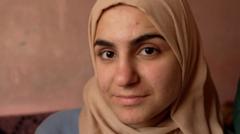In the city of Homs, long dubbed the "capital of the revolution," a blend of joy and sorrow fills the air as residents celebrate a new chapter in their lives following the end of Bashar al-Assad's rule. Baraa, now 20, recalls the haunting memories of her childhood spent in a war-torn city. "Even now, I look back and wonder how we survived this nightmare," she reflects during a visit with her family in their modest home.
Baraa's story resonates with many who endured the hardships of the Syrian conflict. Her father, Farhan, recalls the tragic loss of his wife from a rocket attack, leaving him to raise their daughters alone. Despite the heartache, he finds comfort in the falling prices and the promise of a better future. "Everything is cheaper now, including food and electricity," he says, highlighting the hope that comes with the recent changes.
Alongside Baraa's family, Dr. Hayan al-Abrash, a local physician, grapples with painful memories of his lost brother and his underground hospital, a space covered in the scars of conflict. As they navigate the devastated landscape of their city, a sense of bittersweet nostalgia lingers, with both sadness and a fierce resolve to rebuild interwoven within the very fabric of their lives.
Amidst the rubble, community members, including Muslims and Christians, express their desire to rebuild Homs together. Father Tony Homsy of the local Jesuit church encapsulates the spirit of resilience, sharing a vision of hope grounded in the desire to heal. "It's time to go forward," he states, reflecting on the enduring strength of those who lived through the worst of the war and the power of unity in the face of adversity.
As the people of Homs embark on this renewed journey, they do so recognizing the importance of confronting their past while striving for a brighter, more cohesive future—for themselves and for the generations to come.
Baraa's story resonates with many who endured the hardships of the Syrian conflict. Her father, Farhan, recalls the tragic loss of his wife from a rocket attack, leaving him to raise their daughters alone. Despite the heartache, he finds comfort in the falling prices and the promise of a better future. "Everything is cheaper now, including food and electricity," he says, highlighting the hope that comes with the recent changes.
Alongside Baraa's family, Dr. Hayan al-Abrash, a local physician, grapples with painful memories of his lost brother and his underground hospital, a space covered in the scars of conflict. As they navigate the devastated landscape of their city, a sense of bittersweet nostalgia lingers, with both sadness and a fierce resolve to rebuild interwoven within the very fabric of their lives.
Amidst the rubble, community members, including Muslims and Christians, express their desire to rebuild Homs together. Father Tony Homsy of the local Jesuit church encapsulates the spirit of resilience, sharing a vision of hope grounded in the desire to heal. "It's time to go forward," he states, reflecting on the enduring strength of those who lived through the worst of the war and the power of unity in the face of adversity.
As the people of Homs embark on this renewed journey, they do so recognizing the importance of confronting their past while striving for a brighter, more cohesive future—for themselves and for the generations to come.





















